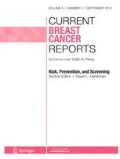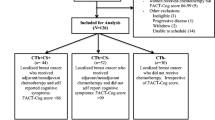Abstract
At least 20 % of women treated with chemotherapy for breast cancer experience some form of cognitive decline. Recent recommendations call for clinicians to screen cognitive abilities. Screening of factors that can contribute to cognitive impairment is also currently recommended. We describe a battery of free, online, self-report surveys that would take approximately 30 min to complete in the context of an overall functional assessment of wellness. Key physical characteristics to be screened include fatigue and insomnia. Significant psychological characteristics include distress, depression, and anxiety. Fundamental social characteristics include basic needs, workplace issues, and interpersonal well-being. Systematic screening that could be completed in the clinic waiting room or during chemotherapy infusion is an important first step towards more holistic patient care that addresses cognitive side effects, just as physical side effects of treatment are routinely addressed.

Similar content being viewed by others
References
Papers of particular interest, published recently, have been highlighted as: • Of importance •• Of major importance
World Health Organization. Cancer: fact sheet 297. 2015. Retrieved from http://www.who.int/mediacentre/factsheets/fs297/en/
American Cancer Society. Global cancer facts and figures, 2nd edition. 2008. Retrieved from http://www.cancer.org/acs/groups/content/@epidemiologysurveilance/documents/document/acspc-027766.pdf
Siegel RL, Miller KD, Jemal A. Cancer statistics. CA Cancer J Clin. 2015;65:5–29. doi:10.3322/caac.21254.
Ahles TA, Saykin AJ. Breast cancer chemotherapy-related cognitive dysfunction. Clin Breast Cancer. 2002;3:S84–90.
Wieneke MH, Dienst ER. Neuropsychological assessment of cognitive functioning following chemotherapy for breast cancer. Psycho-Oncology. 1995;4:61–6. doi:10.1002/pon.2960040108.
Castellon SA, Ganz PA, Bower JE, Petersen L, Abraham L, Greendale GA. Neurocognitive performance in breast cancer survivors exposed to adjuvant chemotherapy and tamoxifen. J Clin Exp Neuropsychol. 2004;26:955–69.
Collins B, Mackenzie J, Kyeremanteng C. Study of the cognitive effects of chemotherapy: considerations in selection of a control group. J Clin Exp Neuropsychol. 2013;35:435–44. doi:10.1080/13803395.2013.781995.
Myers JS. Chemotherapy-related cognitive impairment: the breast cancer experience. Oncol Nurs Forum. 2012;39:E31–40. doi:10.1188/12.
Ando-Tanabe N, Iwamitsu Y, Kuranami M, Okazaki S, Yasuda H, Nakatani Y, et al. Cognitive function in women with breast cancer receiving adjuvant chemotherapy and healthy controls. Breast Cancer. 2012;21:453–62. doi:10.1007/s12282-012-0405-7.
Andreano JM, Waisman J, Donley L, Cahill L. Effects of breast cancer treatment on the hormonal and cognitive consequences of acute stress. Psycho-Oncology. 2012;21:1091–8. doi:10.1002/pon.2006.
Berman MG, Askren MK, Jung M, Therrien B, Peltier S, Noll DC, et al. Pretreatment worry and neurocognitive responses in women with breast cancer. Health Psychol. 2014;33:222–31. doi:10.1037/a0033425.
Breckenridge LM, Bruns GL, Todd BL, Feuerstein M. Cognitive limitations associated with tamoxifen and aromatase inhibitors in employed breast cancer survivors. Psycho-Oncology. 2012;21:43–53. doi:10.1002/pon.1860.
Collins B, Mackenzie J, Stewart A, Bielajew C, Verma S. Cognitive effects of hormonal therapy in early stage breast cancer patients: a prospective study. Psycho-Oncology. 2009;18:811–21. doi:10.1002/pon.1453.
Hurria A, Somlo G, Ahles T. Renaming “chemobrain”. Cancer Investig. 2007;25:373–7. doi:10.1080/07357900701506672.
Shilling V, Jenkins V, Fallowfield J, Howell T. The effects of hormone therapy on cognition in breast cancer. J Steroid Biochem Mol Biol. 2003;86:405–12. doi:10.1016/j.jsbmb.2003.07.001.
Butow PN, Phillips F, Schweder J, White K, Underhill C, Goldstein D. Psychosocial well-being and supportive care needs of cancer patients living in urban and rural/regional areas: a systematic review. Support Care Cancer. 2012;20:1–22. doi:10.1007/s00520-011-1270-1.
Hendren S, Chin N, Fisher S, Winters P, Griggs J, Mohile S, et al. Patients’ barriers to receipt of cancer care, and factors associated with needing more assistance from a patient navigator. J Natl Med Assoc. 2011;103:701–10. doi:10.1016/S0027-9684(15)30409-0.
Wagner LI, Spiegel D, Pearman T. Using the science of psychosocial care to implement the new American College of Surgeons commission on cancer distress screening standard. J Natl Compr Cancer Netw. 2013;1:214–21. This focused review provides practical information on implementing screening standards into routine breast cancer treatment.
Boykoff N, Moieni M, Subramamian SK. Confronting chemobrain: an in-depth look at survivors’ reports of impact on work, social networks, and health care response. J Cancer Surviv. 2009;3:223–32. doi:10.1007/s11764-009-0098-x.
Bower JE. Behavioral symptoms in patients with breast cancer and survivors. J Clin Oncol. 2008;26:768–77. doi:10.1200/JCO.2007.14.3248.
Vichaya EG, Chiu GS, Krukowski K, Lacourt TE, Kavelaars A, Dantzer R, et al. Review article: mechanisms of chemotherapy-induced behavioral toxicities. Front Neurosci. 2015;9:131. doi:10.3389/fnins.2015.00131.
Abraham J, Haut MW, Moran MT, Filburn S, Lemiuex S, Kuwabara H. Adjuvant chemotherapy for breast cancer: effects on cerebral white matter seen in diffusion tensor imaging. Clin Breast Cancer. 2008;8:88–91. doi:10.3816/CBC.2008.n.007.
de Ruiter MB, Reneman L, Boogerd W, Veltman DJ, Caan M, Douaud G, et al. Late effects of high-dose adjuvant chemotherapy on white and gray matter in breast cancer survivors: converging results from multimodal magnetic resonance imaging. Hum Brain Mapp. 2012;33:2971–83. doi:10.1002/hbm.21422.
Deprez S, Amant F, Smeets A, Peeters R, Leemans A, Van Hecke W, et al. Longitudinal assessment of chemotherapy-induced structural changes in cerebral white matter and its correlation with impaired cognitive functioning. J Clin Oncol. 2012;30:274–81. doi:10.1200/JCO.2011.36.8571.
Silverman DH, Dy CJ, Castellon SA, Lai J, Pio BS, Abraham L, et al. Altered frontocortical, cerebellar, and basal ganglia activity in adjuvant-treated breast cancer survivors 5–10 years after chemotherapy. Breast Cancer Res Treat. 2007;103:303–11. doi:10.1007/s10549-006-9380-z.
Runowicz CD, Leach CR, Henry NL, Henry KS, Mackey HT, Cowens-Alvarado RL, et al. American Cancer Society/American Society of Clinical Oncology breast cancer survivorship care guideline. J Clin Oncol. 2016;34:611–35. doi:10.1200/JCO.2015.64.3809. This ASCO special article provides recommendations to assist primary care and other clinicians in the care of breast cancer survivors, including assessment and management of cognitive impairment and contributing factors of cognitive impairment.
American College of Surgeons Commission on Cancer (2016). Cancer program standards: ensuring patient-centered care manual, 2016 edition. Retrieved from https://www.facs.org/~/media/files/quality%20programs/cancer/coc/2016%20coc%20standards%20manual_interactive%20pdf.ashx. This manual describes CoC accreditation requirements including psychosocial distress screening and navigation.
Brady MJ, Cella DF, Mo F, Bonomi AE, Tulsky DS, Lloyd SR, et al. Reliability and validity of the Functional Assessment of Cancer Therapy-Breast quality-of-life instrument. J Clin Oncol. 1997;15:974–86.
Wagner L, Sweet J, Butt Z, Lai J, Cella D. Measuring patient self-reported cognitive function: development of the Functional Assessment of Cancer Therapy–Cognitive Function instrument. J Support Oncol. 2009;7:W32–9.
Dumas JA, Makarewicz J, Schaubhut GJ, Devins R, Albert K, Dittus K, et al. Chemotherapy altered brain functional connectivity in women with breast cancer: a pilot study. Brain Imaging Behav. 2013;7:524–32. doi:10.1007/s11682-013-9244-1.
López Zunini RA, Scherling C, Wallis N, Collins B, MacKenzie J, Bielaiew C, et al. Differences in verbal memory retrieval in breast cancer chemotherapy patients compared to healthy controls: a prospective fMRI study. Brain Imaging Behav. 2013;7:460–77. doi:10.1007/s11682-012-9213-0.
Herrera C, Chambon C, Michel BF, Paban V, Alescio-Lautier B. Positive effects of computer-based cognitive training in adults with mild cognitive impairment. Neuropsychologia. 2012;50:1871–81. doi:10.1016/j.neuropsychologia.2012.04.012.
Conroy SK, McDonald BC, Ahles TA, West JD, Saykin AJ. Chemotherapy-induced amenorrhea: a prospective study of brain activation changes and neurocognitive correlates. Brain Imaging Behav. 2013;7:491–500. doi:10.1007/s11682-013-9240-5.
Downie FP, Mar Fan HG, Houédé-Tchen N, Yi Q, Tannock IF. Cognitive function, fatigue, and menopausal symptoms in breast cancer patients receiving adjuvant chemotherapy: evaluation with patient interview after formal assessment. Psychooncology. 2006;15:921–30. doi:10.1002/pon.1035.
Eberling JL, Wu C, Tong-Turnbeaugh R, Jagust WJ. Estrogen- and tamoxifen-associated effects on brain structure and function. Neuroimage. 2004;21:364–71. doi:10.1016/j.neuroimage.2003.08.037.
Evangelista AL, Santos EM. Cluster of symptoms in women with breast cancer treated with curative intent. Support Care Cancer. 2012;20:1499–506. doi:10.1007/s00520-011-1238-1.
Jenkins V, Shilling V, Fallowfield L, Howell A, Hutton S. Does hormone therapy for the treatment of breast cancer have a detrimental effect on memory and cognition? A pilot study. Psychooncology. 2004;1:61–66.0. doi:10.1002/pon.709.
Lyon DE, Cohen R, Chen H, Kelly DL, Starkweather A, Ahn H et al. The relationship of cognitive performance to concurrent symptoms, cancer- and cancer-treatment-related variables in women with early-stage breast cancer: a 2-year longitudinal study. J Cancer Res Clin Oncol. 2016, 1-14. doi: 10.1007/s00432-016-2163-y
Pinto AC, de Azambuja E. Improving quality of life after breast cancer: dealing with symptoms. Maturitas. 2011;70:343–8. doi:10.1016/j.maturitas.2011.09.008.
Pullens MJ, De Vries J, Van Warmerdam LJ, Van De Wal MA, Roukema JA. Chemotherapy and cognitive complaints in women with breast cancer. Psychooncology. 2013;22:1783–9. doi:10.1002/pon.3214.
Reid-Arndt SA, Yee A, Perry MC, Hsieh C. Cognitive and psychological factors associated with early posttreatment functional outcomes in breast cancer survivors. Psychosoc Oncol. 2009;27:415–34. doi:10.1080/07347330903183117.
Jacobsen PB, Hann DM, Azzarello LM, Horton J, Balducci L, Lyman GH. Fatigue in women receiving adjuvant chemotherapy for breast cancer: characteristics, course, and correlates. J Pain Symp Manag. 1999;18:233–42.
Mock V, Atkinson A, Barsevick A, Cella D, Cimprich B, Cleeland C, et al. NCCN Practice guidelines for cancer-related fatigue. Oncology. 2000;14:151–61.
de Jong N, Courtens AM, Abu-Saad HH, Schouten HD. Fatigue in patients with breast cancer receiving adjuvant chemotherapy: a review of the literature. Cancer Nurs. 2002;25:283–97.
Sitzia J, Huggins L. Side effects of cyclophosphamide, methotrexate, and 5-fluorouracil (CMF) chemotherapy for breast cancer. Cancer Pract. 1998;6:13–21. doi:10.1046/j.1523-5394.1998.1998006013.x.
Jacobsen PB, Garland LL, Booth-Jones M, Donovan KA, Thors CL, Winters E, et al. Relationship of hemoglobin levels to fatigue and cognitive functioning among cancer patients receiving chemotherapy. J Pain Symptom Manag. 2004;28:7–18. doi:10.1016/j.jpainsymman.2003.11.002.
National Heart Lung and Blood Institute. What causes anemia? 2012. Retrieved from http://www.nhlbi.nih.gov/health/health-topics/topics/anemia/causes
Smith E, Lai JS, Cella D. Building a measure of fatigue: the Functional Assessment of Chronic Illness Therapy Fatigue Scale. PMR. 2010;2:359–63. doi:10.1016/j.pmrj.2010.04.017.
Bastien CH, VallieÁres A, Morin CM. Validation of the Insomnia Severity Index as an outcome measure for insomnia research. Sleep Med. 2001;2:297–307. doi:10.1016/S1389-9457(00)00065-4.
Sateia MJ, Lang BJ. Sleep and cancer: recent developments. Curr Oncol Rep. 2008;10:309–18.
Airaksinen E, Larsson M, Lundberg I, Forsell Y. Cognitive functions in depressive disorders: evidence from a population-based study. Psychol Med. 2004;34(1):83–91.
Airaksinen E, Larsson M, Forsell Y. Neuropsychological functions in anxiety disorders in population-based samples: evidence of episodic memory dysfunction. J Psychiatr Res. 2005;39:207–14. doi:10.1016/j.jpsychires.2004.06.001.
Fann JR, Thomas-Rich AM, Katon WJ, Cowley D, Pepping M, McGregor BA, et al. Major depression after breast cancer: a review of epidemiology and treatment. Gen Hosp Psychiatry. 2008;30:112–26. doi:10.1016/j.genhosppsych.2007.10.008.
Mitchell AJ, Chan M, Bhatti H, Halton M, Grassi L, Johansen C, et al. Prevalence of depression, anxiety, and adjustment disorder in oncological, haematological, and palliative-care settings: a meta-analysis of 94 interview-based studies. Lancet Oncol. 2011;12:160–74. doi:10.1016/S1470-2045(11)70002-X.
Lovibond SH, Lovibond PF. Manual for the depression anxiety stress scales. 2nd ed. Sydney: Psychology Foundation; 1995.
Bauer A. Cancer.net, Spotlight on: oncology social workers–Part I, a Q&A. 2014. Retrieved from http://www.cancer.net/blog/2014-04/spotlight-oncology-social-workers-%E2%80%93-part-i-qa
Web Finance Inc. Work environment. 2014. Retrieved from http://www.businessdictionary.com/definition/work-environment.html
Morean DF, O’Dwyer L, Cherney LR. Therapies for cognitive deficits associated with chemotherapy for breast cancer: a systematic review. Arch Phys Med Rehabil. 2015;96:1880–97.
Acknowledgments
The study was supported by an Advanced Rehabilitation Research Training Award: Interventions for Neurologic Communication Disorders (award no. 90AR5015-01-00) from the National Institute on Disability, Independent Living, and Rehabilitation Research (NIDILRR) and the Evergreen Invitational Women’s Health Grants Initiative. The content is solely the responsibility of the authors and does not necessarily represent the official views of the National Institutes of Health.
Author information
Authors and Affiliations
Corresponding author
Ethics declarations
Conflict of Interest
Diane F. Morean and Leora R. Cherney declare that they have nothing to declare.
Human and Animal Rights and Informed Consent
This article does not contain any studies with human or animal subjects performed by any of the authors.
Additional information
This article is part of the Topical Collection on Clinical Trials
Rights and permissions
About this article
Cite this article
Morean, D.F., Cherney, L.R. Screening for Cognitive Impairment Associated with Chemotherapy for Breast Cancer. Curr Breast Cancer Rep 8, 151–157 (2016). https://doi.org/10.1007/s12609-016-0219-2
Published:
Issue Date:
DOI: https://doi.org/10.1007/s12609-016-0219-2



